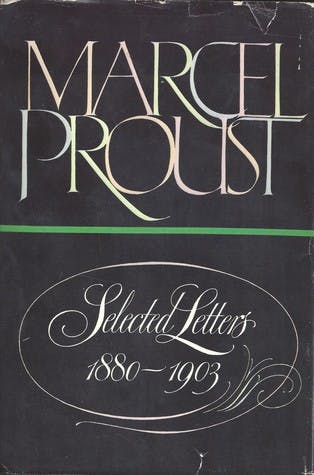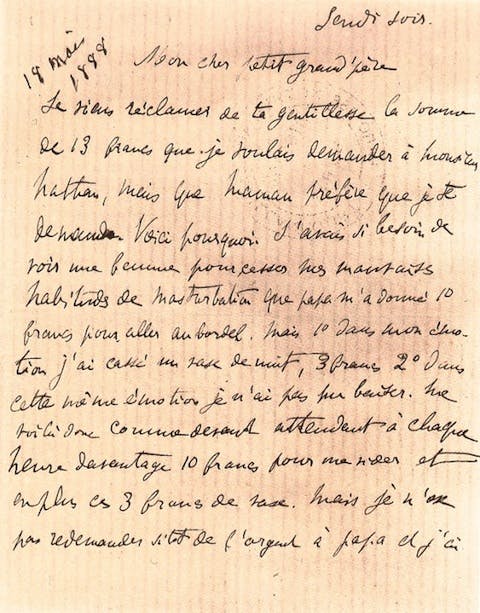In a letter to his mother, the thirty-one-year-old Marcel Proust attributes a certain urethral discomfort to the “oceans of beer” he has been drinking lately. The trivial detail appears at the end of a letter in which, besides quoting from a poem by Musset, he also mentions his insomnia, his asthma, the powders he takes, the enemas he has stopped taking, his pulse rate, the chill he caught that afternoon, his digestion, the irregular hours he has been keeping, the therapeutic decision to avoid all work. The question arises: What does the correspondence of a great writer reveal?
Proust’s own feelings on the matter were ambivalent. He resented the biographical and anecdotal approach of a critic such as Sainte-Beuve. He was convinced that the artist’s social being was of very limited interest, revealing at best only his superficial or even petty self; that only the creative self projected with immense labor into a lasting work of art was worth knowing, it alone was genuine and meaningful. The artistic figures who appear in his own novel—Vinteuil, Bergotte, Elstir—cannot be judged in terms of the impression they make on those who meet them Only their work can tell what they truly were, can communicate the essence of their being.

When some of Proust’s letters were first published in the late 1920s and in the 1930s, even fervent admirers were disappointed. The letters to Robert de Montesquiou and to Countess Anna de Noailles—effete, obsequious, and snobbish—are filled with affectation, ceremonious flattery, and hyperbole.
They certainly did not enhance Proust’s reputation. The perspective has changed radically since then, in large part thanks to the admirable efforts of Philip Kolb who, since 1970, has been publishing the complete correspondence arranged chronologically—a true feat, as Proust was in the habit of not dating his letters. Seventeen or eighteen volumes are projected, of which one-half have appeared so far. But even though the crucial years of the conception and creation of A la Recherche du temps perdu have not yet been reached, we have already enough to suggest that the interest of these letters transcends by far the trivialities of health reports and mundane gossip.
This first volume of Selected Letters, authoritatively edited by Philip Kolb himself, and translated by the seasoned translator Ralph Manheim, covers the years I880-I903: the school years at the lycée Condorcet, the brief period of military service, studies at the university, the beginnings of a social life, the writing and publication of La Plaisirs et les Jours, work on the aborted novel Jean Santeuil, the laborious translation of Ruskin’s Bible of Amiens, for which he enlisted the help of his mother. (His own knowledge of English was virtually nonexistent.) Many of these early letters are of considerable interest. They tell us a great deal about the nature of his adolescent friendships, his intellectual and political concerns, his poetic sensibility; they reveal his precocious literary vocation, his latent gifts as a novelist; they provide insights into how quirks and anxieties were transmuted into the stuff of fiction.
Despite the discontinuities of any correspondence, and the particularly shifting tone of these letters which often mimic the style of the addressee, certain basic character traits emerge. Chief among them is an almost morbid need for affection. Young Marcel is worried about the impression he makes to the point of writing self-portraits that are close to caricatures. This mirror disease in turn is a symptom of a deep narcissism, as well as of his sexual preferences. If Proust the writer was later to camouflage these preferences, there can be no doubt that the adolescent made open advances to several fellow students at the lycée. There is an explicit missive, written in class, to Jacques Bizet, the son of the composer of Carmen, which speaks of “plucking” the delicious flower “that we shall soon be unable to pluck.” There is another one, to Daniel Halevy, in which he declares his admiration for his friend’s agile body, and speaks of sitting on his lap and kissing his eyes. Granted that the style of these letters remains playfully elegant and literary, the preciosity of the language only stresses young Marcel’s discomfort at the boldness of his requests, as well as his fear of being rebuffed (which he apparently was).
Not all is endearing in this correspondence. The literary memory and readiness to quote are often bookish and affected. The self-indulgent, hypochondriac concern for his health became an excuse for procrastination and an anomalous existence. Not only did Proust keep irregular hours, sleeping during the day, reading and eating during the night, but one has the impression at times that he went directly from bed to dinner parties. In the hay fever season he made a point of never going out during the day. Even worse than this self-pampering is the sentimental blackmail he inflicted on his parents, who were doubtless frightened by his psychosomatic crises. When he met with opposition, or merely with criticism, he could easily become moody and temperamental—leaving the dinner table, slamming doors, sulking, writing urgent and annoyed messages. Tantrums were not unheard of. He himself tells, in one of his letters, how on a given occasion he trampled on a friend’s hat, tore it into shreds, and then ripped out the lining! When his father died, he pretended to feel remorse and guilt. In fact, he felt more secure now that he had his mother all to himself.
The intellectual and aesthetic aspects of his character are more appealing. His interest in his studies was genuine, and he liked to establish personal relations with teachers he admired. A letter to his philosophy teacher Darlu is a true consultation in which he himself acutely diagnoses his self-consciousness, the cleavage he feels within himself as a result of excessive intellectualization, the habit of self-contemplation—all of which, he says, kills his spontaneity. Later on, scholarly, hedonistic, and social interests tend to mingle. To his composer friend Reynaldo Hahn he explains in a brief missive that he is still in bed, “drunk with reading Emerson,” but that shortly he intends to go to the Bois, and suggests that they then both attend a defense of a Sorbonne thesis on “The Metaphysics of Sociology.”
Behind this ethos of leisure, there is the stubborn commitment to literature. In its early stages, it took the form of a superficial infatuation. To Anatole France, the seventeen-year-old Proust, signing himself “A Student of Philosophy,” writes the kind of letter his hero Marcel might have written to Bergotte. But literature soon became an obsession, then a vocation. Pressed by his career-minded father, a famous professor of medicine, to make a choice, Proust answered that he could not consider becoming either a lawyer or a stockbroker (there was also some talk of diplomacy, and a more serious attempt to become a librarian)—that whatever was not philosophy or literature was for him wasted time: “temps perdu.” This is precisely the expression, with its double denotation of waste and loss (but a loss to be restored by a proper quest, or “recherche”), which many years later informs the suggestive title of Proust’s great novel.

Some of these letters give a hint of Proust’s early gifts as an incisive critic. In an offhand demonstration of critical virtuosity, he shows for instance how Mallarmé’s images provide dark mirror effects, how under a cloak of archaism his art swiftly moves from an almost bare classical form to the most exuberant preciosity, how his funereal lines solemnize life. The assessment, for the benefit of Reynaldo Hahn, is brilliant. But Proust, in 1896, was less interested in explicating authors than in making use of them. If he reads one novel of Balzac after another, it is in a spirit of apprenticeship. In Gobseck, he claims to have found portraits of old nobles “of the kind I need for my novel.” The creator of characters and themes is on the alert. His first love is, however, a poet’s love of language. He quotes admiringly a line by Victor Hugo which proclaims that the word is a living being. He knows that only through the incantation of words will he be able to give life to the “thousand characters” and the “thousand ideas” that urge him, like the shades that plead with Odysseus in the underworld, to give them life and body.
The fictional gifts displayed in the letters are essentially of a comic nature. This is to be expected in a correspondence so concerned with social life and gossip. The young Marcel draws portraits and caricatures with zest. They seem to be a way of satirizing the foolishness of social life to which he feels only too easily attracted. But here loo, literary self-consciousness seems almost more important than the desire to entertain, or the need to exorcise his irritation with himself. One is constantly aware of literary models. Thus Gogol seems to have inspired the amusing passage on the nose of a royalist fop—a nose that “bristles, bridles, rebels,” aspires to be arrogant, desperately wants to be the nose of a patrician, and only succeeds in parading a resplendent pimple.
Here and there, the correspondence offers poetic and thematic foreshadowings of the great novel to come. There is a letter describing a sunrise seen in a fever from a moving train, with the accompanying wild desire to “rape the sleeping little towns” that glide by. There are letters which contain in germ elements of Swann’s jealousy, which cast light, well ahead of A la Recherche du temps perdu, on the themes of sickness and suffering (and their value for the artist), on the revelatory thrills of synesthesia, on the tragic nonsynchronization of desire, the famous “intermittences of the heart.” The pain of mourning, his mother’s voice “full of cracks and fissures” when she lost her parents, prepared him to relate grief to a sense of beauty and a need for retrieval.
Such adumbrations are not surprising; readers of an artist’s correspondence expect to find them. What is perhaps unexpected is the young aesthete’s concern, and even anxiety, at the time of the Dreyfus case. Proust’s dignified letter to Robert de Montesquiou about his half-Jewish background may be attributed to his devotion to his mother. But there is more to it. A number of letters clearly show his involvement in the events of 1898-1899. This was the year the Dreyfus case came to a violent climax which divided all of France along ideological lines, the year of Esterhazy’s acquittal, of Zola’s courageous protest J’Accuse, of the gathering of intellectuals’ signatures, of the arrest of Colonel Picquart. Proust collected signatures for petitions, he attended Zola’s trial, he wrote indignant letters about the reactionary press, communicated his admiration to Anatole France for having made his name “weigh in the Balance of Justice.” He took pride in the common struggle.
These letters show Proust to be quite well informed. They are thoughtful, at times almost moving, as is the one in which he tries to console his mother when Dreyfus was again found guilty of treason by a court martial—though even in these letters he cannot refrain from referring to Balzac, Shakespeare, or Moliere. Ralph Manheim, the translator, found the right tone. It was not always easy. It is one thing to render straightforward observations on anti-Dreyfusard or anticlerical excesses; and quite another to find the equivalent for the preciousness of the correspondence with Robert de Montesquiou. This English version does justice to both.
